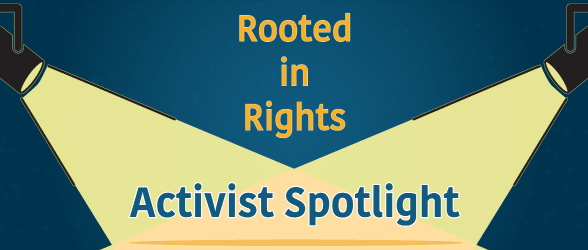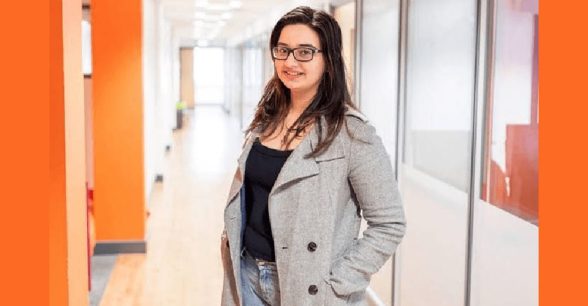My Educational Experiences with Attention Deficit Disorder and Why Accommodations are So Crucial
The following post is part of our series on perspectives from disabled and chronically ill people regarding COVID-19.
The global pandemic has affected each of us in ways no one could have imagined. It has exposed the structural failures of many of the systems we took for granted before the world changed at the beginning of 2020. Aside from the healthcare system and the economy, one could argue that education has been hit the hardest. From the fear and uncertainty of graduating students to parents juggling remote work and the responsibility of suddenly becoming their children’s educators, the stress of the situation is profound for so many.
Students must now deal with new learning environments, the lack of resources to effectively learn remotely, and the consequences of social isolation. Many children are coping with these changes while living with disabilities – disabilities that are often directly related to how they learn. To avoid exacerbating this situation, it should go without saying that accommodations for students with disabilities must carry over from physical classrooms into distance learning, but unfortunately, for many school districts, this is not guaranteed.
In the wake of COVID-19, the needs of students with disabilities have not been given appropriate priority as evidenced by the federal government’s proposal to waive educational accommodation requirements. Thankfully, this did not come to pass, but accommodations have still not been successfully implemented during the pandemic.
Generally, learning has been able to continue despite numerous challenges, but this feat cannot be considered a success when only certain students can participate in the education that all children have a right to. This does not equate a “free and appropriate public education” for all.
As an adult living with Attention Deficit Disorder (ADD), I can attest to how much I was impacted by accommodations when I was a student. I was diagnosed in middle school after struggling through classes that required extra attention from me, like math. In elementary school, I spent much longer than the rest of my classmates trying to process the information in my assignments. This concerned my math teacher, who sent home many notes, but my mother insisted that because the work I eventually turned in was correct, that was all that mattered. It should be noted that I was the only Black child in my first-grade class so the significance of singling me out for being the last to turn in assignments despite them being correct was not lost on my mother or six-year-old me.
Still, my mom helped me with my multiplication tables and other math concepts that could be memorized, but by the time I entered middle school, it was clear that the issue went beyond just math class. The amount of time it took me to finish my assignments could not be overlooked anymore because there were now strict time limits to finish schoolwork. I began to have anxiety about trying to beat the clock because although I knew the answers, I could not make it to all of the questions.
My mom, realizing that she did all she could to help me, brought me to a specialist who gave me an evaluation and explained what ADD was. The world opened up to me because I finally understood why my mind worked differently than other kids’. Still, as a Black student at a predominantly white school, I felt a tinge of self-consciousness that for yet another reason, I was going to be different.
But thanks to the kindness and discretion of most of my teachers, the transition to more accessible learning was overall positive for me. In addition to medication, I received educational accommodations, which included extra time when taking tests and the option to take exams away from other students in a less distracting environment.
I remember feeling a sense of peace when I sat down in a separate area to take tests. My mind still wandered a bit, but there was far less chaos coming in and out of my thoughts from external stimuli. There was no longer a time limit so I could finally focus on what I knew. If it wasn’t for these accommodations, I wouldn’t have had the opportunity to excel in school the way I did.
I received accommodations throughout middle and high school and earned a full scholarship to college, where I studied psychology, in the hopes of helping kids like me. Thankfully, I received accommodations in college too, and was able to keep my GPA high enough to maintain my scholarship throughout all four years.
Still feeling a strong desire to help children, I decided that I could make a bigger impact if I went to law school. By that time, my ADD evaluation had expired and because I didn’t have health insurance, I couldn’t afford to get re-evaluated and was no longer eligible for accommodations. Nevertheless, I was excited to embark on this journey and told myself that I could do anything if I worked hard enough.
But law school turned out to be the most difficult time of my life, no matter how hard I worked. Those three years are immensely challenging for most people, but they were difficult for me because of my inability to concentrate, organize, and process ideas as quickly as my peers.
For most law students, some things can be done to make the ordeal easier. One of these is participating in study groups where students not only study together but they make course outlines – the “holy grail” of law school exams. Much of the purpose of study groups is to split up the work of creating outlines between group members to save time. The first time I attended a study group, my brain simply could not keep up with what the others were speaking about as they deciphered legal concepts together.
During class, I relied on my medication and a tape recorder to fill the gap that not having accommodations left. I barely contributed because I was lost much of the time. I was wracked with anxiety again because I knew class participation was a large part of the overall grade. In addition, as one of the few Black students in my classes, I felt a responsibility to speak up when my white colleagues expressed bigoted opinions, but because of my lack of confidence with the material, I was unable to say anything.
Completely glazed over from the onslaught of information in class, I would rush home to listen to my recorded lectures and read over my case law books, taking notes as I went along. This took me hours. It took so long that most of the time, I wouldn’t finish before it was time to go to class again.
Knowing how long it took me to grasp the material, I decided that my time would be better spent on self-studying than wasting precious time in a study group. Since I did not participate in this practical law school tradition, I didn’t have access to completed outlines and had to study from my half-finished ones. I fumbled through my exams but my saving grace was that I could write well. In my first year, I did not do terribly enough to get kicked out, as some other students did, but I did lose my small scholarship.
The next two torturous years went by about the same – with me isolating myself to hours of study and I eventually fell into a depression that caused me to self-medicate in unhealthy ways. I nearly failed a few classes and only found solace in my Family Law courses, where we discussed my passion, child advocacy. I graduated with a GPA slightly above 2.0 and almost didn’t attend graduation because I was so disappointed in myself.
Because of this experience, to this day, I suffer from the emotional and financial ramifications of not having had the chance to be at my best while earning my law degree. If I had received accommodations in law school, my experience during and after school may not have been easy, but it would not have manifested in some of the detrimental ways that it did.
Instead of feeling like I was unintelligent because I wasn’t able to reach the goals I set for myself and be on par with my classmates, I would have had the emotional capacity to fully understand what I’d learned in middle school, that there was nothing wrong with me, my brain just worked differently.
There are so many others besides myself who need and have benefitted from educational accommodations. My story may be the result of the failings of the healthcare system and the economy during that time, but it is no different now for students who are suffering because the basic right to an equal education is at risk due to a global pandemic.
I hope that in sharing my story, it will help push the needle towards change, and children today can have a fair shot at the same educational success their peers have access to because they are provided with the tools they need. Students with disabilities should not be disadvantaged because those in power are not prioritizing their rights to the “free and appropriate public education” that all students deserve, even during challenging times.
About Rooted In Rights
Rooted in Rights exists to amplify the perspectives of the disability community. Blog posts and storyteller videos that we publish and content we re-share on social media do not necessarily reflect the opinions or values of Rooted in Rights nor indicate an endorsement of a program or service by Rooted in Rights. We respect and aim to reflect the diversity of opinions and experiences of the disability community. Rooted in Rights seeks to highlight discussions, not direct them. Learn more about Rooted In Rights



